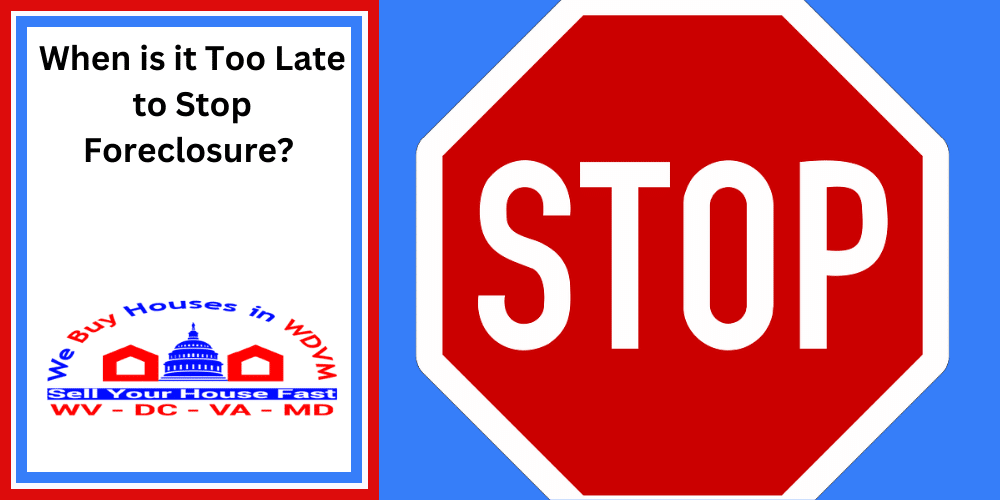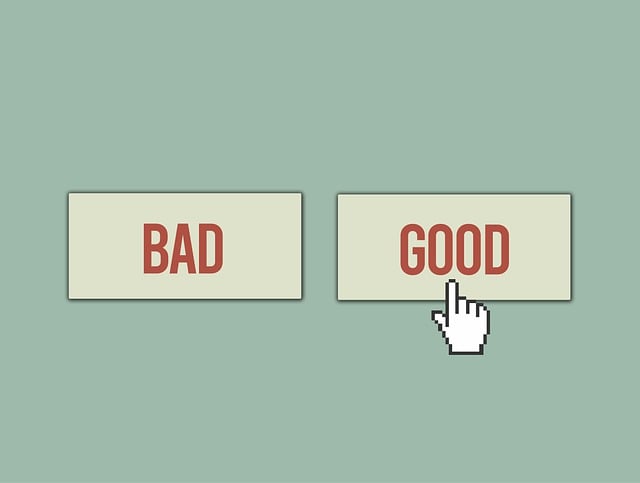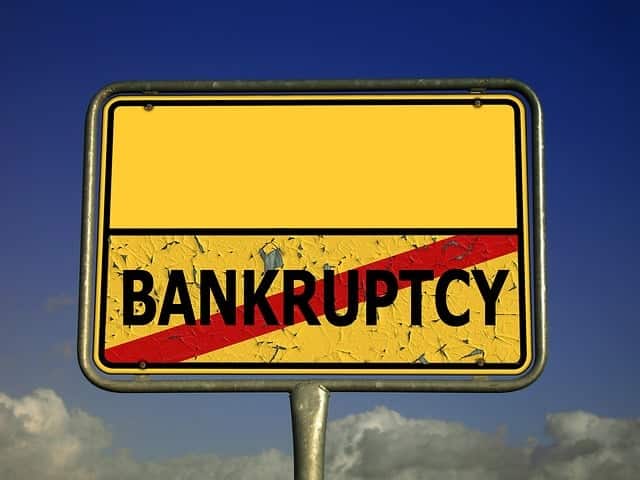When is it Too Late to Stop Foreclosure? Exploring Your Options and Timelines

Foreclosure is a legal process through which a lender takes possession of a property when the homeowner fails to make mortgage payments. It is a distressing situation that can have long-lasting consequences for individuals and families. However, it is important to remember that there are options available to homeowners, even if they find themselves on the brink of foreclosure.
One of the key factors that determine when it is too late to stop foreclosure is the stage of the foreclosure process. Generally, homeowners have more options available to them in the early stages of foreclosure, such as loan modification or refinancing. As the process progresses, these options become more limited, and it may become increasingly difficult to save the home.
Another important consideration is the homeowner’s ability to make up missed payments and bring the mortgage current. If the homeowner is unable to catch up on payments, it may be too late to stop foreclosure. However, it is always worth exploring options such as negotiating with the lender or seeking assistance from housing counseling agencies.
Additionally, the laws and regulations regarding foreclosure vary from state to state, so it is crucial for homeowners to understand their rights and the specific timelines in their jurisdiction. Seeking legal advice from an attorney familiar with foreclosure laws can provide valuable guidance and potentially delay or stop the foreclosure process.
In conclusion, the question of when it is too late to stop foreclosure is a complex one. It depends on various factors such as the stage of the foreclosure process, the homeowner’s ability to catch up on payments, and the specific laws in their jurisdiction. However, it is important for homeowners to remember that there are always options available, and seeking professional advice can help navigate this challenging situation. Stay tuned as we delve deeper into the topic and provide insights on how to prevent foreclosure and protect your home.
When Is It Too Late to Stop Foreclosure?
Foreclosure can be a daunting prospect for homeowners, but it is important to understand that there are options available to stop the process. However, many people wonder when it is too late to take action and prevent foreclosure. While there is no definitive answer, there are several factors to consider.

Stage of the Foreclosure Process
One of the key factors to consider is the stage of the foreclosure process. In the early stages, it is generally easier to negotiate with the lender and explore alternatives such as loan modifications or repayment plans. As the process progresses, it becomes increasingly difficult to halt foreclosure proceedings.
The Lenders Policies
Another important consideration is the timeline set by the lender. Each lender may have different policies and deadlines for stopping foreclosure. It is crucial to communicate with the lender as soon as possible to understand their requirements and explore potential solutions.
Seeking Professional Assistance
Additionally, seeking professional assistance can greatly impact the outcome. Consulting with a foreclosure attorney or a housing counselor can provide valuable insights and guidance on the best course of action. These professionals can help navigate the complex legal aspects of foreclosure and potentially negotiate with the lender on behalf of the homeowner.
Multiple Options Available
It is worth noting that even if the foreclosure process has already begun, there may still be options available. For example, filing for bankruptcy can trigger an automatic stay, temporarily halting foreclosure proceedings. However, it is important to consult with a bankruptcy attorney to understand the implications and potential consequences of this action.
In conclusion, while there is no definitive answer to when it is too late to stop foreclosure, taking early action and seeking professional assistance can greatly improve the chances of finding a solution. By understanding the stage of the foreclosure process, communicating with the lender, and exploring available options, homeowners can make informed decisions and potentially avoid foreclosure.
How Does Foreclosure Work?
Foreclosure is a legal process that occurs when a homeowner is unable to make their mortgage payments, resulting in the lender taking possession of the property. Understanding how foreclosure works is crucial for homeowners facing financial difficulties and seeking to avoid losing their homes.

Payment Delinquency
The foreclosure process typically begins when a homeowner falls behind on their mortgage payments. After a certain period of delinquency, the lender will issue a notice of default, informing the homeowner of their intent to start foreclosure proceedings. This notice is usually followed by a grace period, during which the homeowner can make up the missed payments and bring the loan current.
Notice of Default
If the homeowner fails to resolve the delinquency during the grace period, the lender will proceed with filing a lawsuit to initiate foreclosure. The lawsuit will be filed in the county where the property is located, and the homeowner will be served with a summons and complaint.
Court Issues a Judgment
Once the lawsuit is filed, the homeowner has the opportunity to respond and present any defenses they may have against the foreclosure. However, if the homeowner does not respond or does not have a valid defense, the court will issue a judgment in favor of the lender. This judgment allows the lender to proceed with a foreclosure sale, where the property is auctioned off to the highest bidder.
It is important to note that the foreclosure process timeline can vary depending on the state and individual circumstances. However, regardless of the specific timeline, it is crucial for homeowners to seek assistance as soon as they face financial difficulties to explore options to avoid foreclosure.
In conclusion, understanding how foreclosure works is essential for homeowners facing financial difficulties. By being aware of the process and seeking help early on, homeowners may have more options available to them to stop foreclosure and protect their homes.
What Are the Consequences of Foreclosure?
Foreclosure is a daunting prospect for homeowners, and understanding its consequences is crucial. When facing the possibility of foreclosure, it is important to be aware of the potential outcomes. This section will explore the various consequences that homeowners may face when unable to stop foreclosure.

Loss of the House
One of the most significant consequences of foreclosure is the loss of one’s home. After the foreclosure process is complete, the homeowner is forced to vacate the property, leaving behind the place they once called home. This can be emotionally devastating and disrupt the stability of the entire family.
Financial Repercussions
In addition to losing their home, homeowners who go through foreclosure may also face financial repercussions. Foreclosure can have a long-lasting negative impact on an individual’s credit score, making it difficult to secure future loans or credit cards. This can affect their ability to purchase a new home or even rent a property.
Legal Consequences
Furthermore, foreclosure can result in legal consequences. In some cases, lenders may pursue a deficiency judgment, which allows them to seek repayment for the remaining balance on the mortgage after the sale of the foreclosed property. This can lead to wage garnishment or other legal actions to recover the debt.
Mental Health Impact
Foreclosure can also have a significant impact on a homeowner’s mental and emotional well-being. The stress and uncertainty of the process can take a toll on individuals and their families, leading to increased anxiety, depression, and strained relationships.
In conclusion, the consequences of foreclosure are far-reaching and can have a lasting impact on homeowners. From the loss of a home to financial and legal repercussions, the effects can be devastating. It is important for homeowners to explore all possible options and seek assistance as early as possible to avoid reaching the point where it is too late to stop foreclosure.
Can You Stop Foreclosure Once It Starts?
Foreclosure can be a daunting and distressing experience for homeowners. The fear of losing one’s home can be overwhelming, and many people wonder if there is any way to stop the foreclosure process once it has begun. While every situation is unique, there are still options available to homeowners, even if the foreclosure process is already underway.

Negotiate With the Lender
One possible solution is to negotiate with the lender. Communication is key in this situation, as lenders may be willing to work out a solution that allows the homeowner to keep their property. This could involve modifying the loan terms, such as reducing the interest rate or extending the repayment period. It is important to act quickly and present a compelling case to the lender, emphasizing any extenuating circumstances that may have led to the foreclosure.
Professional Assistance
Another option is to seek assistance from a housing counselor or foreclosure prevention agency. These professionals are well-versed in foreclosure laws and can provide guidance on the available options. They may be able to negotiate with the lender on the homeowner’s behalf or help them apply for government programs designed to prevent foreclosure.
File Bankruptcy
Bankruptcy is also a possibility to stop foreclosure. Filing for bankruptcy puts an automatic stay on all collection activities, including foreclosure. This provides temporary relief and allows the homeowner to explore other options, such as loan modification or repayment plans.
It is important to note that the earlier one takes action, the more options they will have to stop foreclosure. However, even if the foreclosure process has already started, it is not necessarily too late to save one’s home. By exploring the available options and seeking professional assistance, homeowners can increase their chances of stopping foreclosure and protecting their most valuable asset.
What Are the Alternatives to Foreclosure?
Facing the possibility of foreclosure can be a daunting and overwhelming experience. However, it is important to remember that there are alternative ways to stop foreclosure immediately that are available to homeowners who find themselves in this situation. By exploring these alternatives, individuals may be able to avoid the negative consequences of foreclosure and find a solution that works for them.

loan Modification
One alternative to foreclosure is loan modification to stop foreclosure. This involves renegotiating the terms of the mortgage with the lender in order to make the monthly payments more affordable. Loan modification can help homeowners who are struggling to make their payments due to financial hardship, such as job loss or medical expenses.
Short Sale
Another option is a short sale. In a short sale, the homeowner sells the property for less than the amount owed on the mortgage. While this may result in a loss for the homeowner, it can help them avoid the damaging effects of foreclosure. Additionally, some lenders may be willing to forgive the remaining balance on the mortgage after a short sale.
Repayment Plan
For homeowners who want to keep their homes but are unable to make their mortgage payments, a repayment plan may be an option. This involves working with the lender to develop a plan to repay the missed payments over time. This can provide temporary relief and allow homeowners to catch up on their mortgage.
Deed in Lieu of Foreclosure
Lastly, homeowners may consider a deed in lieu of foreclosure. This involves voluntarily transferring ownership of the property to the lender in exchange for the cancellation of the mortgage debt. While it may still have a negative impact on the homeowner’s credit, it can be a less damaging option than foreclosure.
In conclusion, when facing the possibility of foreclosure, it is important to explore all available alternatives. Loan modification, short sale, repayment plans, and deeds in lieu of foreclosure are all options that may help homeowners avoid the negative consequences of foreclosure. By understanding these alternatives, individuals can make informed decisions and take steps towards finding a solution that works for them.
Is Bankruptcy an Option to Stop Foreclosure?
When facing the threat of foreclosure, homeowners often wonder “can bankruptcy stop foreclosure” and be a viable solution? To save their homes, bankruptcy is a legal process that provides individuals with financial relief and can potentially halt foreclosure proceedings. However, it is essential to understand the implications and limitations of filing for bankruptcy in this context.

Chapter 13 Bankruptcy
One option available to homeowners is Chapter 13 bankruptcy, also known as a reorganization bankruptcy. This type of bankruptcy allows individuals to create a repayment plan to catch up on missed mortgage payments over a specified period, typically three to five years. By doing so, homeowners can stop foreclosure and keep their homes as long as they adhere to the repayment plan.
Chapter 7 Bankruptcy
Another bankruptcy option is Chapter 7, which involves the liquidation of assets to pay off debts. While Chapter 7 can provide temporary relief by triggering an automatic stay on foreclosure proceedings, it does not offer a long-term solution to save the home. Once the bankruptcy process is complete, the lender can resume foreclosure proceedings.
Bankruptcy Consequences
It is important to note that filing for bankruptcy should not be taken lightly. It can have long-lasting effects on an individual’s credit score and financial future. Additionally, not all homeowners will qualify for bankruptcy, as eligibility requirements vary depending on factors such as income and debt levels.
In conclusion, to answer the question “does bankruptcy stop foreclosure?” While bankruptcy can be an option to stop foreclosure, it is not a guaranteed solution for everyone. Homeowners considering this route should consult with a qualified bankruptcy attorney to assess their specific circumstances and explore all available alternatives.
What Are the Steps to Stop Foreclosure?
Facing foreclosure can be a daunting and stressful experience for any homeowner. However, it is important to remember that there are steps you can take to potentially stop the foreclosure process. By understanding your options and acting quickly, you may be able to save your home.

Communicate With the Lender Immediately
One of the first steps you should take is to contact your lender as soon as possible. Communication is key in these situations, and by reaching out to your lender, you can explore potential alternatives to foreclosure. This could include loan modification, repayment plans, or forbearance options.
Seek Professional Assistance
Another option to consider is seeking assistance from a housing counselor. These professionals are trained to help homeowners navigate the foreclosure process and can provide guidance on available resources and programs. They can also help you create a budget and explore other avenues to prevent foreclosure.
Explore Bankruptcy Options
If you are unable to reach an agreement with your lender or housing counselor, you may want to consider filing for bankruptcy. While this should be a last resort, it can provide you with temporary relief from foreclosure proceedings and give you the opportunity to reorganize your finances.
Consider Selling Your House
Additionally, you could explore the option of selling your home. If you are unable to afford your mortgage payments, selling your home could help you avoid foreclosure and potentially recoup some of your investment.
In conclusion, it is never too late to try and stop foreclosure. By taking proactive steps, such as contacting your lender, seeking assistance from a housing counselor, considering bankruptcy, or exploring the option of selling your home, you may be able to find a solution that allows you to keep your home or minimize the impact of foreclosure. Remember, time is of the essence, so it is crucial to act quickly and explore all available options.
Can You Negotiate with the Lender to Stop Foreclosure?
Facing foreclosure can be an overwhelming experience for any homeowner. The fear of losing your home and the uncertainty of what lies ahead can be incredibly stressful. However, there may still be options available to you, even if you find yourself in the midst of the foreclosure process. One possible avenue to explore is negotiating with your lender.
Negotiating with your lender to stop foreclosure is indeed a possibility. Many lenders are willing to work with homeowners to find a mutually beneficial solution. This could involve modifying the terms of your loan, such as reducing the interest rate or extending the repayment period. In some cases, lenders may even be open to accepting a lump sum payment to bring the loan current.
To increase your chances of success when negotiating with your lender, it is important to act quickly. As soon as you realize you may be facing foreclosure, reach out to your lender and explain your situation. Be prepared to provide documentation that supports your financial hardship, such as pay stubs, bank statements, and tax returns. This will help your lender understand your circumstances and evaluate potential options.
It is important to note that negotiating with your lender does have its limitations. There may be certain deadlines or criteria that must be met in order to stop the foreclosure process. Each lender will have their own policies and procedures in place, so it is crucial to communicate with them directly to understand the specific requirements.
In conclusion, while negotiating with your lender to stop foreclosure is a possibility, it is essential to act swiftly and provide the necessary documentation to support your case. By engaging in open and honest communication with your lender, you may be able to find a solution that allows you to keep your home. Remember, every situation is unique, and it is important to consult with legal and financial professionals for personalized advice.
Conclusion
Furthermore, understanding when it is too late to stop foreclosure is crucial for homeowners facing financial difficulties. Throughout this post, we have explored various topics related to foreclosure and provided valuable insights into the key questions surrounding this issue.
We began by discussing the timeline of foreclosure and how it works. It is important to act quickly once you receive a notice of foreclosure to have the best chance of stopping the process. We also highlighted the severe consequences of foreclosure, including damage to credit scores and the potential loss of your home.
While it can be challenging to stop foreclosure once it has started, we explored several alternatives that homeowners can consider. These include loan modifications, short sales, and deed in lieu of foreclosure. Additionally, we discussed the possibility of using bankruptcy as an option to halt the foreclosure process.
To stop foreclosure, we outlined the steps homeowners can take, such as contacting their lender, seeking legal advice, and exploring government programs available to assist in foreclosure prevention. Negotiating with the lender is also a viable option, as they may be willing to work out a repayment plan or modify the terms of the loan.
The importance of this topic cannot be overstated, as foreclosure can have long-lasting effects on individuals and families. It is crucial to be proactive and seek assistance as soon as financial difficulties arise.
Looking ahead, it is essential to stay informed about any future developments or trends that may impact foreclosure and its prevention. Changes in government policies or economic conditions can significantly influence the options available to homeowners.
Finally, we would like to thank you for reading this post. We hope that the information provided has been helpful and informative. If you have any questions or feedback, we encourage you to leave a comment below. Remember, taking action and seeking assistance early on can make a significant difference in stopping foreclosure.

About Justin Mitchell
Justin, the owner and operator of “We Buy Houses In WDVM,” is a seasoned professional with a knack for providing solutions to individuals looking to sell their homes or investment properties quickly, regardless of the circumstances.
With a wealth of experience in various buying and selling scenarios, Justin excels at simplifying transactions and ensuring a stress-free process for all parties involved.
Whether you’re seeking a swift cash purchase or exploring alternative selling solutions, Justin is dedicated to finding a win-win outcome for you. As a legitimate house buyer,
Justin boasts a stellar rating on Google Reviews, a testament to his commitment to customer satisfaction.
Visit his “Beat Any Offer” page to understand why he values presenting sellers with concrete facts over mere opinions. Discover why he believes that facts matter most when it comes to creatively selling a house fast.
Table of Contents

